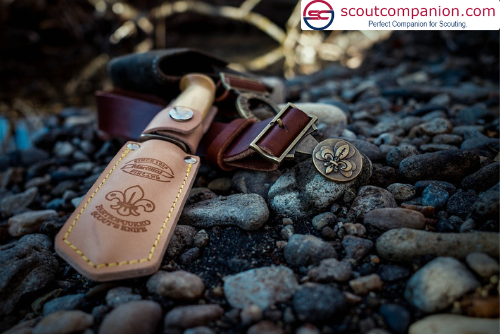Fun Merit Badge Activities at home are a fantastic way to combine learning, creativity, and skill-building while having a great time. If you’re a Scout looking to earn badges, then these activities offer opportunities to dive into exciting topics from crafting and cooking to exploring science experiments. However, the merit badge system in Scouting is about much more than just outdoor activities—it provides opportunities for scouts to develop important life skills, explore creative pursuits, and enhance their knowledge in a wide array of areas.
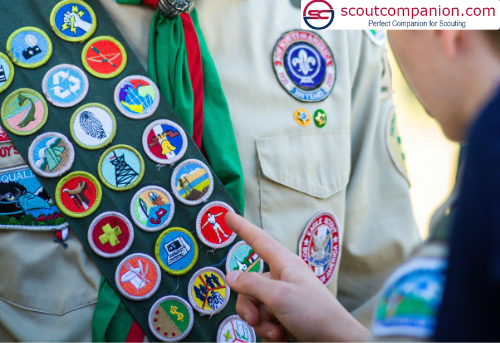
Table of Contents
Introduction
While merit badges like Hiking, Camping, and Pioneering are often linked with outdoor adventures, there are plenty of merit badges that scouts can work on indoors. These indoor merit badges provide a wide range of opportunities for learning and growth. Whether you’re indoors due to weather, scheduling conflicts, or simply want to try something new, completing merit badges from home can be a highly productive and rewarding experience.
The following essay delves into different 7 merit badges that scouts can pursue at home. These badges promote creativity, skill development, and self-growth, making them an excellent option for scouts who want to continue their journey without needing to leave their home. The Boy Scouts of America (BSA) has a rich history centered around the development of young individuals into responsible, capable citizens. Scouting has long been associated with outdoor adventures such as camping, hiking, and survival skills.
Why Earn Merit Badges at Home?
Merit badges are designed to promote growth, self-sufficiency, and exploration in a variety of fields. While outdoor badges are often the most recognized, a large number of merit badges focus on skills that can be practiced indoors. These activities promote the development of important life skills, personal growth, and the opportunity to explore new hobbies and interests. Earning merit badges at home has several distinct advantages that make them an excellent choice for scouts.
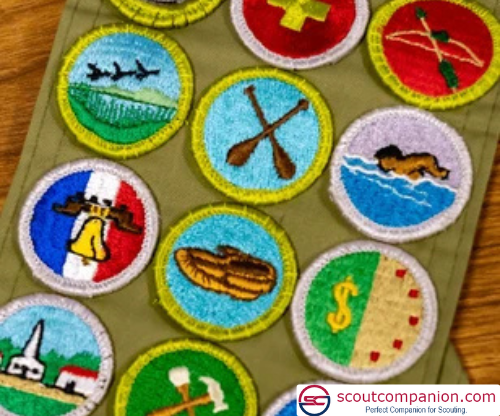
- Flexibility and Convenience: One of the most significant advantages of earning merit badges from home is the ability to work at your own pace. Scouts can complete the requirements according to their schedules, adjusting their time and workload to suit their needs. This flexibility is particularly useful for those who may not have access to outdoor spaces, have limited time for scouting activities, or experience inclement weather.
- Skill Development: Many merit badges that can be earned at home focus on developing valuable life skills that can be used immediately. From learning how to cook, manage finances, or stay fit, these badges help scouts acquire skills that promote independence and self-reliance. These practical life skills can have a profound impact on a scout’s ability to navigate adulthood successfully, as they teach everything from time management and goal setting to financial planning and healthy living.
- Creative Exploration: Indoor merit badges, such as those in the arts (e.g., Art, Photography, or Music), encourage creative exploration. These badges provide scouts with an outlet to express themselves artistically and experiment with different mediums and techniques. Creative activities also help develop problem-solving skills, critical thinking, and attention to detail.
- Involvement and Bonding with Family: Many merit badge activities can be done in collaboration with family members. For instance, scouts may work with parents to cook meals, participate in fitness challenges with siblings, or create art projects together. This helps scouts develop important relationships with family members and create lasting memories while working toward earning merit badges.
- Building Discipline and Independence: Earning merit badges from home requires initiative and self-discipline. Scouts must set their own goals, follow through with tasks, and manage their time effectively to complete the requirements. These activities help scouts develop self-reliance and perseverance—key qualities that can serve them well throughout their lives.
Types of Fun Merit Badge Activities at Home to Learn and Earn
The merit badge program offers a wide variety of badges that can be earned indoors, covering everything from creative endeavors to life skills. Below is an expanded list of merit badges that scouts can work on from home, with detailed descriptions of the activities and ideas for each one.
1. First Aid Merit Badge
First Aid is one of the most important merit badges a Scout can earn, as it teaches life-saving skills. While it’s commonly associated with hands-on activities like CPR or bandaging, many aspects of the First Aid badge can be completed at home. Scouts can practice basic first aid techniques such as wound care, splinting, and how to treat burns and cuts. Online tutorials and resources from the American Red Cross can supplement this learning. Once the skills are mastered, Scouts can demonstrate their knowledge to a parent or guardian as part of the badge’s requirements.
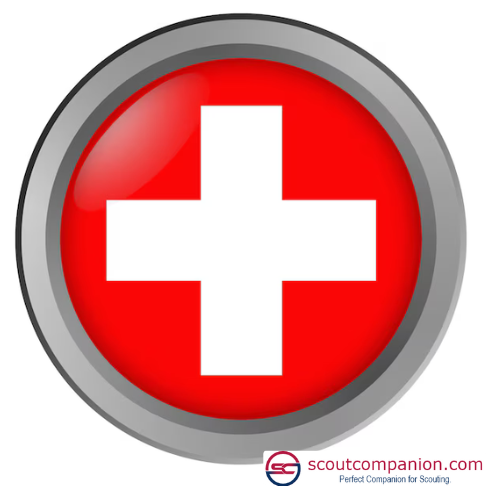
Activities for First Aid Merit Badge:
- Learn and practice wound care: Create a first aid kit and practice treating minor cuts, scrapes, and abrasions. You can use bandages, antiseptic wipes, and gauze pads to simulate wounds and practice cleaning, dressing, and covering them.
- Splinting and Bandaging: Use rolled-up towels, wooden sticks, or other household objects to practice creating splints for a broken arm or leg. Practice wrapping bandages securely but not too tight to avoid cutting off circulation.
- CPR Practices: You can practice CPR on a mannequin or even with an online simulation, but remember that for official certification in CPR, you will need to take a class or use certified training programs.
- Create and Emergency Response Plan: Develop and practice an emergency plan for your home, focusing on what to do in case of a medical emergency. Assign roles to family members (e.g., who will call 911, who will retrieve the first aid kit) and walk through potential scenarios.
- Burn Prevention: Create a list of common household burns (like those from the stove, fireplace, or hot water) and demonstrate how to prevent them. You can also practice fire safety, such as how to safely extinguish a fire or what to do if clothes catch fire.
2. Art Merit Badge
The Art Merit Badge is a fantastic choice for scouts interested in exploring their creative side. This badge encourages self-expression through a variety of artistic mediums, such as drawing, painting, sculpture, and more. Whether a scout is a beginner or has prior experience, this badge offers numerous ways to build artistic skills and develop new techniques.
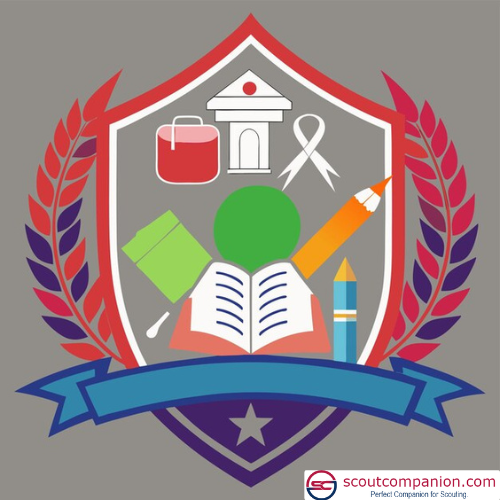
Activities for Art Merit Badge:
- Drawing and Sketching: Scouts can start by practicing basic drawing techniques, such as sketching simple shapes, learning about perspective, and shading. They can also challenge themselves by drawing more complex subjects, like animals, people, or landscapes. Exploring different materials such as pencils, charcoal, or ink can help scouts experiment with textures and effects.
- Painting: Painting provides an opportunity to explore color theory and different mediums, including watercolors, acrylics, or oils. Scouts can work on painting landscapes, portraits, or still life from around the house. Experimenting with different techniques—such as blending, glazing, or dry brushing—can help scouts improve their painting skills.
- Sculpture: Sculpting is another fantastic way for scouts to engage creatively. Using materials such as clay, wire, or even recycled objects like cardboard or plastic, scouts can create sculptures of animals, abstract forms, or everyday objects. This activity helps develop fine motor skills, spatial awareness, and artistic vision.
- Art History: As part of this badge, scouts can research famous artists and art movements. For example, they can study the works of renowned painters like Van Gogh, Picasso, or Michelangelo, and learn about different art movements such as Impressionism, Surrealism, or Cubism. Scouts could even try to recreate famous works of art or create their own interpretations inspired by these artists.
- Portfolio Creation: To track their progress, scouts should compile their works into a portfolio. This could be a digital or physical collection of their drawings, paintings, and sculptures. A portfolio not only helps scouts review their artistic journey but also serves as a source of pride in their accomplishments.
By the end of the Art Merit Badge, scouts will have explored their creative abilities and built a collection of artwork that demonstrates their growth as artists.
3. Cooking Merit Badge
Cooking is an essential life skill that every scout should learn. The Cooking Merit Badge offers scouts the chance to develop culinary skills, understand nutrition, and explore the science of cooking. Scouts can work on this badge indoors by planning, preparing, and cooking meals from various cuisines, all while learning about healthy eating habits.
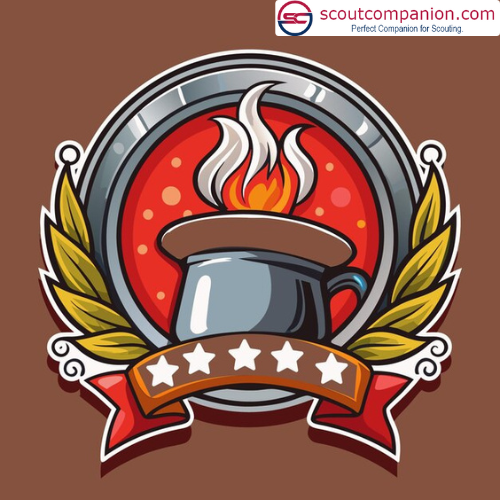
Activities for Cooking Merit Badge:
- Meal Planning and Preparation: Scouts can practice their cooking skills by planning meals for their families, from breakfast to dinner. They can learn how to follow recipes, use cooking techniques like sautéing, boiling, and roasting, and manage kitchen tools like knives, pots, and pans. Additionally, they will learn about portion control, food presentation, and how to manage time efficiently when preparing meals.
- Baking: Baking is an integral part of cooking and can be a fun and rewarding activity. Scouts can bake breads, cakes, cookies, or pies, learning about baking techniques like measuring ingredients accurately, kneading dough, and adjusting recipes based on dietary restrictions. This will also help them understand the chemical reactions that occur during baking.
- Exploring Global Cuisine: To expand their culinary knowledge, scouts can choose a country or region and learn to prepare traditional dishes. For example, they might cook Italian pasta dishes, Japanese sushi, or Mexican tacos. This activity introduces them to different cultures and their cuisines while expanding their cooking repertoire.
- Nutritional Education: As part of the Cooking Merit Badge, scouts learn about balanced diets, the importance of nutrition, and how different foods affect the body. They can study the food pyramid, review food labels, and make healthy substitutions in their recipes. For example, using whole grains instead of refined grains or reducing sugar content in baked goods.
- Food Safety and Hygiene: Food safety is an essential aspect of cooking. Scouts should learn how to store food safely, maintain proper hygiene in the kitchen, and avoid cross-contamination. Practicing good hygiene, like washing hands before cooking, is crucial for preparing meals safely and avoiding food borne illnesses.
By completing the Cooking Merit Badge, scouts will gain confidence in the kitchen and be prepared to cook for themselves and their families in the future.
4. Personal Fitness Merit Badge
The Personal Fitness Merit Badge is about more than just physical exercise; it focuses on overall wellness, including diet, mental health, and long-term fitness goals. Earning this merit badge at home is a great way to stay active, improve health, and build habits for a healthy lifestyle.
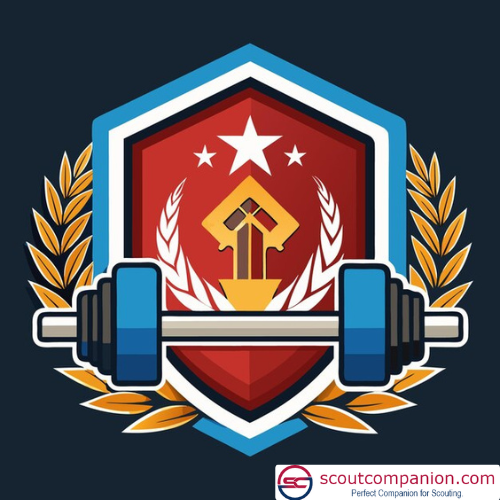
Activities for Personal Fitness Merit Badge:
- Creating a Fitness Plan: Scouts can design their fitness plans, setting goals for cardiovascular health, strength, and flexibility. They can incorporate daily or weekly exercises like jogging, jumping rope, or doing push-ups and sit-ups. Over time, they can track their progress and make adjustments to increase the intensity or diversify their workouts.
- Body weight Workouts: For those without gym equipment, body weight exercises like push-ups, squats, lunges, and planks are excellent for building strength and endurance. Scouts can develop routines that target different muscle groups, helping to improve overall fitness. As they progress, they can challenge themselves with more advanced exercises.
- Cardio Activities: Cardio exercises such as running, walking, or cycling are great ways to improve heart health. Scouts can set goals for distance or time, monitor their progress, and see improvements over time. These activities can be done inside a home, such as running on a treadmill, or outside in a safe neighborhood or park.
- Nutrition and Hydration: Personal fitness isn’t just about exercise—it’s also about fueling the body with the right foods. Scouts can learn about macro-nutrients (proteins, fats, carbohydrates) and micro-nutrients (vitamins and minerals), and how they contribute to overall fitness. They can also understand the importance of hydration and how to stay properly hydrated during workouts.
- Tracking Progress: Scouts can maintain a fitness journal to track their achievements and progress. This could include logging daily workouts, noting improvements in endurance or strength, or recording how they feel after exercising. Tracking progress helps scouts stay motivated and set realistic fitness goals.
5. Environmental Science Merit Badge
Environmental Science is an increasingly important field of study as the world grapples with climate change, resource depletion, and sustainability challenges. Earning this merit badge allows scouts to learn about the environment and become stewards of the planet.
Activities for Environmental Science Merit Badge:
- Water Conservation: Scouts can investigate ways to reduce their water usage at home. This could involve checking for plumbing leaks, installing water-efficient fixtures, or changing habits (like shorter showers or turning off the faucet while brushing teeth).
- Recycling and Waste Management: Setting up a household recycling system and learning about waste reduction techniques are key components of this badge. Scouts can also learn to compost organic waste and identify items that should be recycled rather than thrown away.
- Nature Observation: Scouts can observe local wildlife and plant life. By keeping a nature journal, they can track the seasonal changes in their environment, identify species, and learn about biodiversity.
- Energy Efficiency: Scouts can assess the energy use in their home and implement changes to reduce consumption. This might include switching to LED light bulbs, unplugging electronics when not in use, or using energy-efficient appliances.
- Sustainable Living Practices: Scouts can also take steps toward sustainable living, such as growing a small vegetable garden or adopting Eco-friendly habits like reducing plastic use, buying locally produced food, or using non-toxic cleaning supplies.
Earning the Environmental Science Merit Badge helps scouts become more conscious of their impact on the world and teaches them how to reduce their ecological footprint.
6. Communication Merit Badge
Effective communication is a vital skill in both personal and professional life. The Communication merit badge encourages Scouts to improve their speaking, writing, and listening abilities. To earn this badge, Scouts can complete tasks like writing a speech, giving a presentation, or participating in a group discussion. They might also create a podcast or write articles about a topic they are passionate about. Practicing communication skills with family members, friends, or through digital platforms allows Scouts to develop confidence in their abilities.
Activities for Communication Merit Badge:
- Prepare and Deliver a Speech: Scouts must write and deliver a speech on a topic of their choice. This activity helps improve public speaking skills, confidence, and the ability to communicate ideas effectively. The speech should be clear, organized, and appropriately timed.
- Write a Letter or Article: Scouts must write a letter or an article for a publication, such as a newsletter, blog, or community bulletin. This activity emphasizes writing skills, clarity, and understanding how to communicate with different audiences through the written word.
- Participate in a Group Discussion: Scouts are required to participate in a group discussion, where they must actively listen and contribute ideas in a constructive and respectful manner. This activity promotes effective verbal communication, listening skills, and the ability to collaborate in a group setting.
7. Family Life Merit Badge
The Family Life merit badge is designed to foster good family relationships and teach responsibilities. While this badge involves completing tasks like setting goals, helping with household chores, and learning about family dynamics, it can all be done at home. Scouts can work on improving their communication skills, assist with family budgeting, or take on leadership roles in family activities. This badge offers an opportunity to strengthen bonds with family members while learning valuable life skills.
Activities for Family Life Merit Badge:
- Create a Family Plan: Develop a plan with your family that includes goals, responsibilities, and the ways each member can contribute to maintaining a happy and healthy home. You can include family communication practices, chores, or even plans for family outings. This activity helps Scouts understand the importance of teamwork and collaboration within a family.
- Complete Household Tasks: Scouts are required to participate in regular household chores for a specific amount of time, such as helping with cooking, cleaning, or yard work. By completing these tasks, Scouts learn responsibility and the value of contributing to the well-being of the home.
- Discuss Family Values: Have a discussion with your family about the values that are important to your household. This could include topics like honesty, respect, kindness, or responsibility. Write down the values and reflect on how they impact the decisions and behavior within the family. This activity helps Scouts gain insight into the role family values play in shaping a supportive and loving home environment.
Conclusion
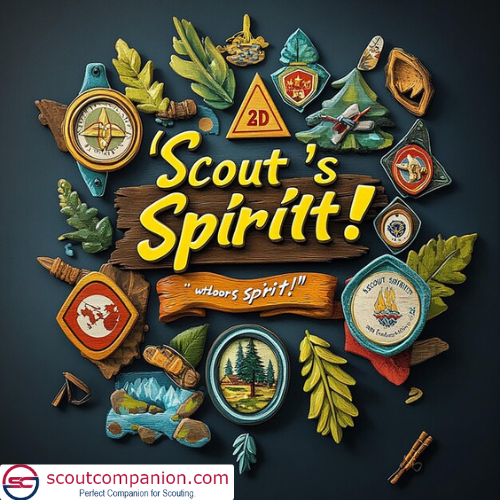
This fun merit badge activities at home system is a cornerstone of the Boy Scouts of America program, offering young people the opportunity to develop new skills, pursue their interests, and grow personally. Earning merit badges from home not only provides scouts with flexibility and convenience but also helps them continue their personal development during challenging times or when they are unable to participate in outdoor activities.Whether learning to cook, developing fitness routines, exploring art, or gaining a better understanding of the environment, scouts have countless opportunities to expand their knowledge and improve their skills without ever leaving home.
By completing fun merit badge activities at home, scouts not only stay connected to their Scouting journey but also develop valuable skills that will serve them well for a lifetime.In a world that is increasingly virtual and often unpredictable, earning merit badges from home is a way to stay engaged, inspired, and productive. It’s a reminder that adventure and growth are possible in any setting, and the values of Scouting—curiosity, creativity, responsibility, and self-sufficiency—can thrive regardless of location.
